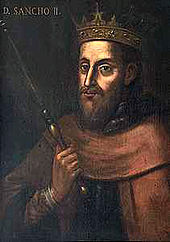Sancho II (Portugal)
Sancho II , known as the monk ( Portuguese: Dom Sancho II , o Capelo ) (* 1207 or 1209 ; † after January 3, 1248 in Toledo ) was the fourth king of Portugal from the House of Burgundy .
Life
He was the son of the Portuguese King Alfonso II and his wife Urraca of Castile . When Sancho II ascended the throne in 1223 after the death of his father, the country found itself in the middle of a battle with the Catholic Church , into which it had been led by the policies of Alfonso II. His father died excommunicated and the interdict imposed on Portugal . Sancho II initially came to terms with the church, had the Archbishop of Braga, whom his father had expelled from the country, return and paid him high compensation. He succeeded in conquering the eastern Algarve and the Alentejo from the Moors (defeat at Elves in 1226, victory at Aimonte in 1239).
Towards the end of his reign, however, Sancho II became increasingly entangled in power struggles with the church, especially with the bishops of Lisbon and Porto, who had the support of Pope Gregory IX. found. In 1238, Sancho II was also excommunicated. The nobility opposition in the country now allied with the church and tried to win the king through his younger brother, the later Alfons III. , to replace.
After 1240 Sancho married the distantly related Leonese noblewoman Mécia Lópes de Haro , but since the marriage was concluded without papal dispensation, the Church divorced her in 1245 or 1246. The aim was to prevent the king from having legitimate offspring. In retrospect, this fear was unfounded as the couple remained childless.
In March 1245 or 1246 Pope Innocent IV accused the king of the worst offenses in the bull “ Inter alia desiderabilia ”, on July 24th he declared him “unfit ruler ( rex inutilis )” and Alfonso III in “ Grandi non immerito ” . as the “administrator and defender” of the kingdom; thus the king was de facto deposed. Sancho II was not prepared to accept this without a fight, so Portugal was plunged into a serious civil war. Sancho II was able to hold out with his followers until 1247, then he had to go into exile in Toledo, where he finally died.
Sancho II received his nickname the monk because he supposedly regularly wore a monk's robe. He is said to have been buried in this robe, similar to the habit of the Franciscans or Augustinians .
ancestors
|
Alfonso I of Portugal (1109–1185) |
Mathilde of Savoy (1125-1157) |
Raimund Berengar IV. (1113–1162) |
Petronella of Aragon (1136–1173) |
Sancho III. of Castile (1133–1158) |
Blanka of Navarre (? –1157) |
Heinrich II. Plantagenet (1133–1189) |
Eleanor of Aquitaine (1122–1204) |
||||||||||||||||||||||||||||||||||||||||||||||||||||||
|
Sancho I of Portugal (1154-1211) |
Dulce of Barcelona (1160–1198) |
Alfonso VIII of Castile (1155-1214) |
Eleonore Plantagenet (1161-1214) |
||||||||||||||||||||||||||||||||||||||||||||||||||||||||||
|
Alfonso II of Portugal (1185-1223) |
Urraca of Castile (1186-1220) |
||||||||||||||||||||||||||||||||||||||||||||||||||||||||||||
|
Sancho II of Portugal (1207-1248) |
|||||||||||||||||||||||||||||||||||||||||||||||||||||||||||||
See also
literature
- Hermenegildo Fernandes: D. Sancho II. Tragédia . Circulo de Leitores, Lisbon 2006, ISBN 972-42-3727-3 .
- Peter Feige: Sancho II, King of Portugal . In: Lexicon of the Middle Ages (LexMA). Volume 7, LexMA-Verlag, Munich 1995, ISBN 3-7608-8907-7 , Sp. 1360 f.
Web links
- Portugal, Kings. In: Medieval Lands. foundation for Medieval Genealogy, accessed February 15, 2012 .
- Castile & Leon Nobility (1). In: Medieval Lands. foundation for Medieval Genealogy, accessed February 15, 2012 .
Remarks
- ↑ a b c d e In the Lexicon of the Middle Ages . Volume 7, Col. 1360-1361 (* 1209 in Coimbra · † after January 3, 1248 in Toledo) is given by Foundation for Medieval Genealogy (* November 8, 1207; † January 3, 1248 in Toledo). LexMA names 1240/42 for the marriage and gives the date of annulment as February 12, 1245, the papal bull as March 1245 and the deposition as July 24, 1245. FMG dates the marriage to probably 1246 and the deposition on July 25, 1246. According to FMG , Mécia Lópes de Haro's first husband died in 1240.
| predecessor | Office | successor |
|---|---|---|
| Alfonso II |
King of Portugal 1223–1248 |
Alfons III |
| personal data | |
|---|---|
| SURNAME | Sancho II. |
| ALTERNATIVE NAMES | Sancho II of Portugal; Sancho the monk |
| BRIEF DESCRIPTION | King of Portugal |
| DATE OF BIRTH | 1207 or 1209 |
| DATE OF DEATH | after January 3, 1248 |
| Place of death | Toledo , Spain |

